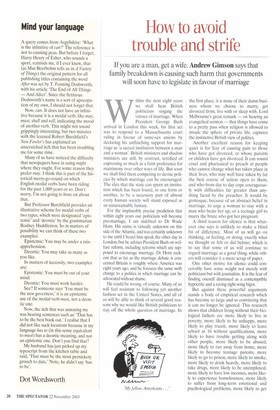Mind your language
A query comes from Argyllshire: 'What is the infinitive of can?' The reference is not to canning peas. But before I forget, Harry Henry of Esher, who sounds a sport, reminds me, III ever knew, that (as Max Beerbohm tells us in A Variety of Things) the original pattern for all publishing titles containing the word After was set by T. Fenning Dodsworth, with his article 'The End of All Things — And After'. Since the fictitious Dodsworth's name is a sort of apocopation of my own, I should not forget that.
Now, can. It does not have an infinitive because it is a modal verb, like may, must, shall and will, indicating the mood of another verb. This might not sound grippingly interesting, but two minutes with the learned Robert Burchfield's New Fowler's has explained an unscratched itch that has been troubling me for some time.
Many of us have noticed the difficulty that newspapers have in using might where they ought. For some reason they prefer may. I think this is part of the historical merry-go-round on which English modal verbs have been riding for the past 1.000 years or so. Don't worry, I'm not going to bore on about that, But Professor Burchfield provides an illustrative scheme for modal verbs of two types, which were designated `epistemic' and 'deontic' by the grammarian Rodney Huddleston. So in matters of possibility we can think of these two examples:
Epistemic: You may be under a misapprehension.
Deontic: You may take as many as you like.
In matters of necessity, two examples are: Epistemic: You must be out of your mind.
Deontic: You must work harder.
See? If someone says 'You must be the new governess,' it is an epistemic use of the modal verb must, not a deontic one.
Now, the itch that was annoying me was hearing sentences such as: 'That has to be the best book out.' I realise that I did not like such locutions because in my language has to (in this sense equivalent to must) has a deontic meaning, and not an epistemic one. Don't you find that?
My husband has just picked up my typescript from the kitchen table and said, 'That must be the most pernickety grouch to date.' Note, he didn't say 'has to be'.


























































































 Previous page
Previous page